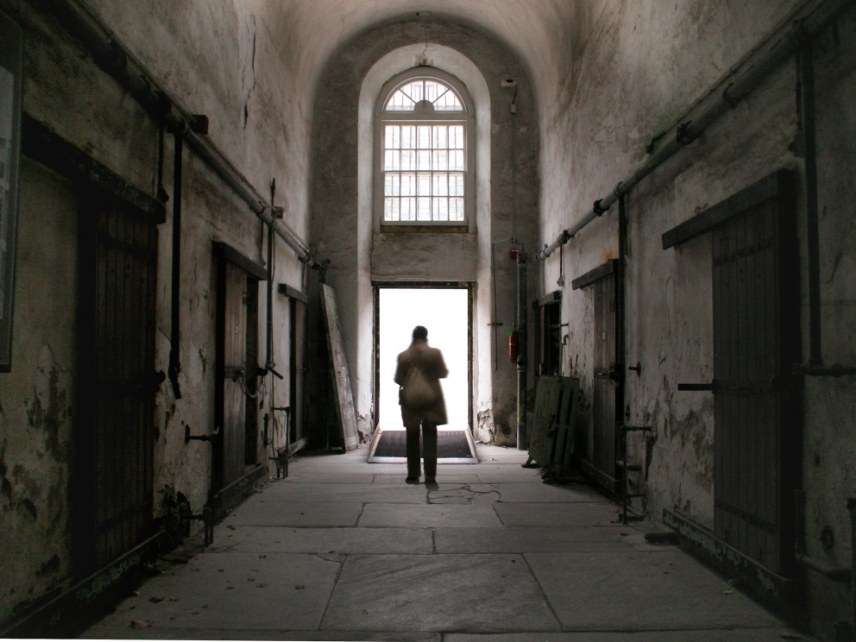Discovery of Police Corruption Freed Dozens of Imprisoned Americans in 2017
Government misconduct a big driver of exonerations last year.

In 2017, 84 Americans were freed from prison after revelations of government misconduct helped prove them innocent. That sets a record, according to an annual report on exonerations in America.
It's actually only part of the picture. An additional 96 defendants in Chicago and Baltimore were released last year in "group exonerations" as a result of two very high-profile police corruption cases.
The details are part of the National Registry of Exonerations' annual report, a project by the University of California Irvine Newkirk Center for Science and Society, the University of Michigan Law School, and the Michigan State University College of Law. All in all, 139 exonerations were added to their registry for 2017, a drop from 171 in 2016. Though the total number of exonerations came down, a record number of people were exonerated due to official misconduct, mistaken eyewitness identification, false confessions, and perjury or false accusations.
There has been a significant decline in exoneration for drug crimes—just 16 this year—and that's because a backlog of cases from Harris County, Texas, has finally been cleared. In Harris County, the district attorney's office discovered hundreds of cases where defendants pleaded guilty to drug possession but subsequent crime lab tests discovered no actual illegal substances in the drugs. The county has been working since 2014 to go through all these cases and free people imprisoned for substances that turned out to not be illegal.
These stats do not include the group exonerations in Chicago and Baltimore, because the National Registry treats them separately from targeted exonerations of individuals who have had to prove their innocence from behind bars. Around 1,800 people were freed in such group exonerations from 1989 to 2017; the number of targeted exonerations in that period is 2,161.
Some other interesting stats:
- Defendants who were exonerated in 2017 served an average of 10.6 years in prison before being freed, adding up to a total of 1,478 total years of life lost.
- Ledura Watkins, 61, was convicted of murder in 1976 in Detroit. After serving 41 years in prison, he was exonerated and released in June after details came out about faulty forensic evidence and police and prosecutor misconduct. His case represents the longest sentence served by anybody on the registry.
- The registry keeps tabs of several different types of official misconduct that lead to innocent people being imprisoned. Among the behaviors that led to this record-setting year, the most common form was concealing evidence.
- Of the 51 cases where a person convicted of homicide was subsequently exonerated in 2017, 43 involved official misconduct in some fashion. That's 84 percent.
- There were 29 exonerations involving false confessions in 2017, another record. Almost half the cases took place in the Chicago area, many involving a Chicago detective accused of abusing suspects during interrogations. Eleven exonerations were a result of false confessions connected to that one detective.
- In 66 exonerations—almost half the total—the underlying crime didn't even happen. Sixteen of these were drug possession cases, 11 were child sex abuse cases, and nine were murder cases. One severe case in Louisiana saw Rodricus Crawford convicted of first-degree murder and sentenced to death after his infant boy was found dead in his home in 2012. Police and prosecutors insisted Crawford had killed the boy, but the conviction was reversed when the defense was able to provide enough evidence that the boy died of bronchopneumonia.
- Feeding into the problem of people being convicted of crimes that didn't even happen, there were a record 87 exonerations connected to witnesses who perjured themselves or otherwise falsely accused the defendant. In 40 cases, a defendant was accused and convicted of a crime that didn't even take place.
The Registry of Exonerations' reporting only goes back to 1989. But this week they've also unveiled a database of 369 exonerations that they have been able to track down that took place prior to 1989, going all the way back to 1920. Exonerations were much less frequent, but the circumstances around them were similar to what we see today—faulty eyewitnesses, bad forensics science, official misconduct.
"Fifty or a hundred years ago, an innocent defendant in prison had no one to turn to," said Michigan State University law professor Barbara O'Brien, editor of the registry, in a press release. "The main reason we're seeing more exonerations now is that they can seek help from innocence organizations and prosecutors' offices who are committed to fixing wrongful convictions and are increasingly working together."
The report notes that organizations devoted to helping people prove their innocence participated in 54 exonerations last year—another record. On Monday, I moderated a panel at South by Southwest in Austin that included Rebecca Brown, policy director of the Innocence Project. Brown discussed reforms that can help keep innocent people from getting caught up in the justice system, and we talked about what can be done to help those who have been exonerated. An audio recording of the panel can be heard here.


Show Comments (35)